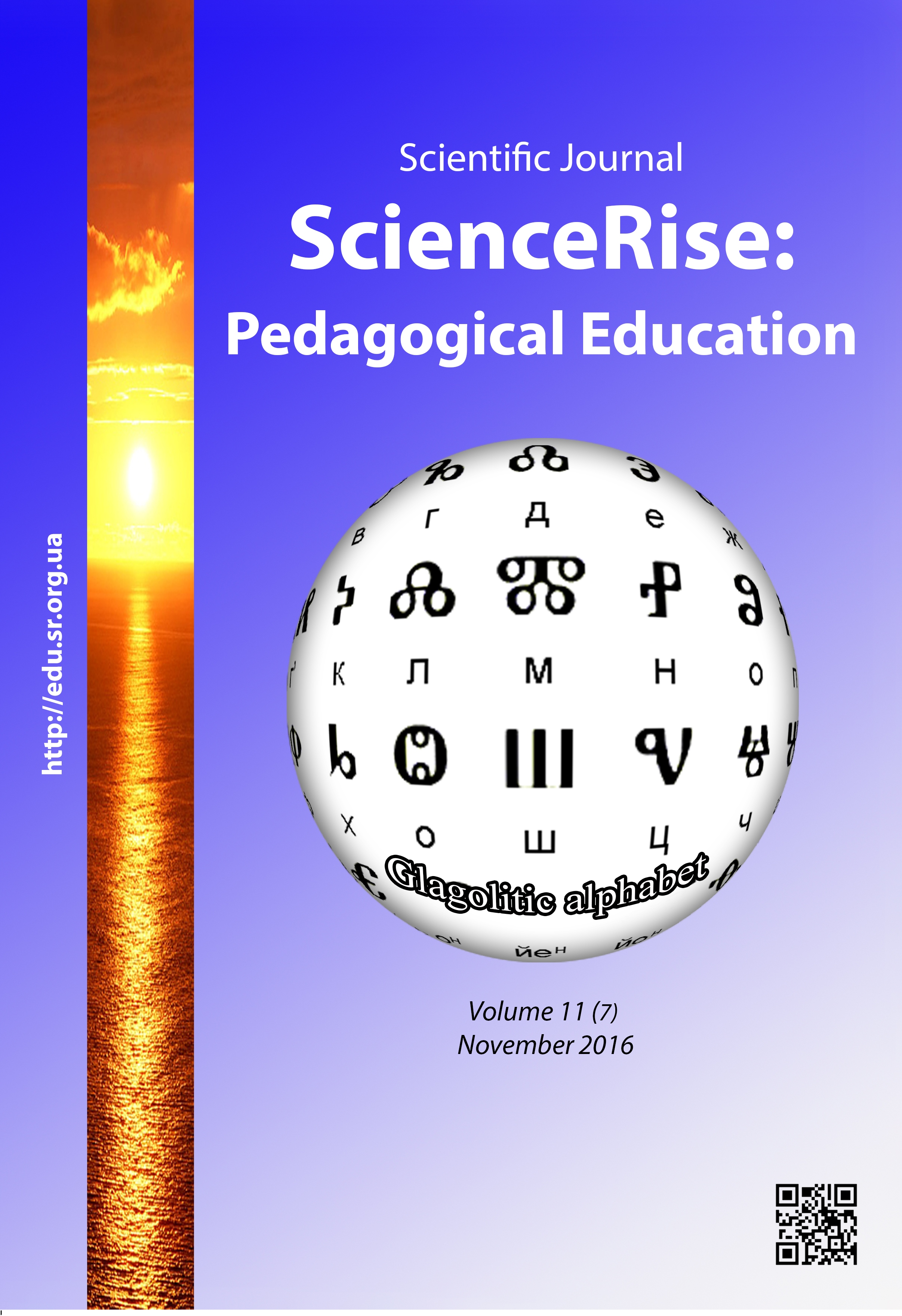Professional training of the future teachers of Ukrainian literature to the work with phenomena of literary process: theoretical and practical aspects
DOI:
https://doi.org/10.15587/2519-4984.2016.82641Keywords:
literary process, literary direction, art work, impressionism, teacher of Ukrainian literatureAbstract
The author analyzes the problem of studying factors and phenomena of literary process in the school course of Ukrainian literature. On the base of researches Lilik О. О. makes a conclusion that it is necessary to train the future teachers to the work with the facts and phenomena of literary process for the effective analysis of literary works. For attaining the aims of research the author elaborated the special course of methodology of teaching Ukrainian literature and introduced it into educational process. Methodological model of training of future teachers of the literature to the work with the facts and phenomena of literary process was created and probated in the context of this course. The author offered the own scheme of the work with facts and phenomena of literary process that is visualized in the article by mastering the notion “impressionism”.
The students-philologists of MA course after pedagogical practice at school took part in the experiment. The author of the article explains the students’ attitude to the study of literary notions at the lessons of the literature, defines the methods and techniques used by the teachers at the work with these notions, studies the role of visual means in mastering theoretical and literary notions and considers the ways of the raise of professional development of future teachers in this field
References
- Postanova «Pro zatverdzhennja Derzhavnogo standartu bazovoi' i povnoi' zagal'noi' seredn'oi' osvity» (2013). Kabinet Ministriv Ukrai'ny, 1392. Available at: http://zakon3.rada.gov.ua/laws/show/1392-2011-%D0%BF
- Bondarenko, Ju. I. (2009). Teorija i praktyka navchannja ukrai'ns'koi' literatury na filosofs'ko-istorychnyh zasadah u starshyh klasah zagal'noosvitn'oi' shkoly. Nizhyn: Vydavnyctvo NDU im. Mykoly Gogolja, 351.
- Gradovs'kyj, A. V. (2003). Komparatyvnyj analiz u systemi shkil'nogo kursu literatury: metodologija ta metodyka. Cherkasy: Brama, 292.
- Zhyla, S. O. (2004). Teorija i praktyka vyvchennja ukrai'ns'koi' literatury u vzajemozv'jazkah iz riznymy vydamy mystectv u starshyh klasah zagal'noosvitn'oi' shkoly. Kyiv, 465.
- Nezhyva, L. L. (2014). Metodychna model' vyvchennja literaturnyh naprjamiv kriz' pryzmu synergetyky ta pedagogichnyh strategij evrystyky. Naukovyj visnyk Donbasu, 2. Available at: http://nvd.luguniv.edu.ua/archiv/NN26/12.pdf
- Tokman', G. L. (2012). Metodyka navchannja ukrai'ns'koi' literatury v serednij shkoli. Kyiv: VC «Akademija», 312.
- Ukrai'ns'ka literatura. Programa dlja zagal'noosvitnih navchal'nyh zakladiv. 10–11 klasy. Riven' standartu, akademichnyj riven' (zi zminamy, zatverdzhenymy nakazom MON vid 14.07.2016 № 826) (2016). Kyiv, 2016.
- Kima, L. T. (2009). Vyvchennja teorii' literatury v shkil'nomu kursi slovesnosti. Vyvchajemo ukrai'ns'ku movu ta literaturu, 14, 15–18.
- Miroshnychenko, L. F. (2000). Metodyka vykladannja svitovoi' literatury v serednih navchal'nyh zakladah. Kyiv: Lenvit, 240.
- Lilik, O. O. (2016). Speckurs z metodyky navchannja ukrai'ns'koi' literatury. Chernigiv: Chernigivs'kyj nacional'nyj pedagogichnyj universytet imeni T. G. Shevchenka, 16.
- Pjehota, O. M. (2009). Indyvidual'nist' uchytelja: teorija i praktyka. Mykolaiv: Ilion, 272.
- Kraevs'kij, V. V, Berezhnova, E. V. (2006). Metodologija pedagogiki: novyj jetap. Moscow: Akademija, 393.
- Voloshyna, N. J., Bandura, O. M., Gal'onka, O. A. et. al.; Voloshyna, N. J. (Ed.) (2002). Naukovi osnovy metodyky literatury. Kyiv: Lenvit, 344.
Downloads
Published
How to Cite
Issue
Section
License
Copyright (c) 2016 Ольга Олександрівна Лілік

This work is licensed under a Creative Commons Attribution 4.0 International License.
Our journal abides by the Creative Commons CC BY copyright rights and permissions for open access journals.
Authors, who are published in this journal, agree to the following conditions:
1. The authors reserve the right to authorship of the work and pass the first publication right of this work to the journal under the terms of a Creative Commons CC BY, which allows others to freely distribute the published research with the obligatory reference to the authors of the original work and the first publication of the work in this journal.
2. The authors have the right to conclude separate supplement agreements that relate to non-exclusive work distribution in the form in which it has been published by the journal (for example, to upload the work to the online storage of the journal or publish it as part of a monograph), provided that the reference to the first publication of the work in this journal is included.







